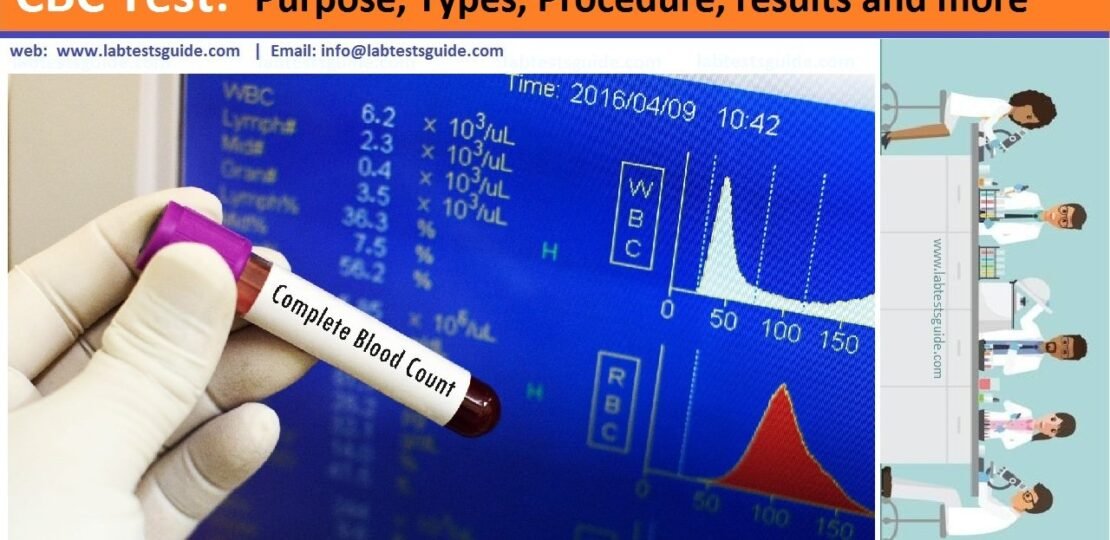
A complete blood count, or CBC, is an easy and very common test that screens for certain disorders that can affect your health.
A CBC determines if there are any increases or decreases in your blood cell counts. Normal values vary depending on your age and your gender. Your lab report will tell you the normal value range for your age and gender.

Also Known as: CBC, Hemogram, CBC with Differential, Blood CE, Blood CP, Blood C/E, Blood RE, Blood R/E
Test Panel: Hemoglobin, Red Blood Cells (RBC), HCT, MCV, MCH, MCHC, Platelets Count, White Blood Cells (WBC), DLC, ESR
Why Get Tested:
- It is a general screening test and gives tremendous information’s about the hematological system and another organ system.
- It will differentiate between acute or chronic infection.
- It will diagnose and type the anemia.
- It will diagnose any type of leukemia.
- These are easy, inexpensive and rapid to perform.
- It will find any abnormality in the count of platelets.
When to Get Tested:
Your doctor may order a CBC as part of a routine checkup or if you have unexplained symptoms such as bleeding or bruising. A CBC can help your doctor do the following.
- Evaluate your overall health. Many doctors will order a CBC so they can have a baseline view of your health. A CBC also helps your doctor screen for any health problems.
- Diagnose a health problem. Your doctor may order a CBC if you have unexplained symptoms like weakness, tiredness, fever, redness, swelling, bruising, or bleeding.
- Monitor a health problem. Your doctor may regularly order CBCs to monitor your condition if you have been diagnosed with a disorder that affects blood cell counts.
- Monitor your treatment. Certain medical treatments can affect your blood cell counts and may require regular CBCs. Your doctor can evaluate how well your treatment is working based on your CBC.
Sample Required :
- The best sample is blood in EDTA.
- Also, prepare fresh peripheral blood smear.
- This is inexpensive, easy to perform and rapidly done as a screening test.
CBC (Complete blood count) includes:
This is the measure of:
- Red blood cells.
- White blood cells.
- Platelet Count
- Hemoglobin
- Hematocrit (HCT)
- RBC indices.
- White cell differential count (DLC) includes.
- Peripheral blood smear study.
Referance Ranges:
| Test Name | Male | Female |
| Haemoglobin | 12-17.5 g/dL | 11.3-15.3 g/dL |
| RBC | 4.5 – 6.5 x 1012 /l | 4.5 – 6.5 x 1012 /l |
| HCT | 38 – 52 % | 38 – 52 % |
| MCV | 75 – 95 fl | 75 – 95 fl |
| MCH | 26 – 32 pg | 26 – 32 pg |
| MCHC | 30-35 g/dl | 30-35 g/dl |
| Platelets Count | 150 – 450 x 109 /l | 150 – 450 x 109 /l |
| WBC (TLC) | 4.0 – 11.0 x 109 /l | 4.0 – 11.0 x 109 /l |
| Neutrophils (Poly) | 40 – 75 % | 30-35 g/dl |
| Lymphocytes | 20 – 50 % | 20 – 50 % |
| Monocytes | 2- -10 % | 2- -10 % |
| Eosinophils | 1- 6 % | 1- 6 % |
| ESR | Upto 15 mm/1st Hour | Upto 15 mm/1st Hour |
Related Articles:
RELATED POSTS
View all
